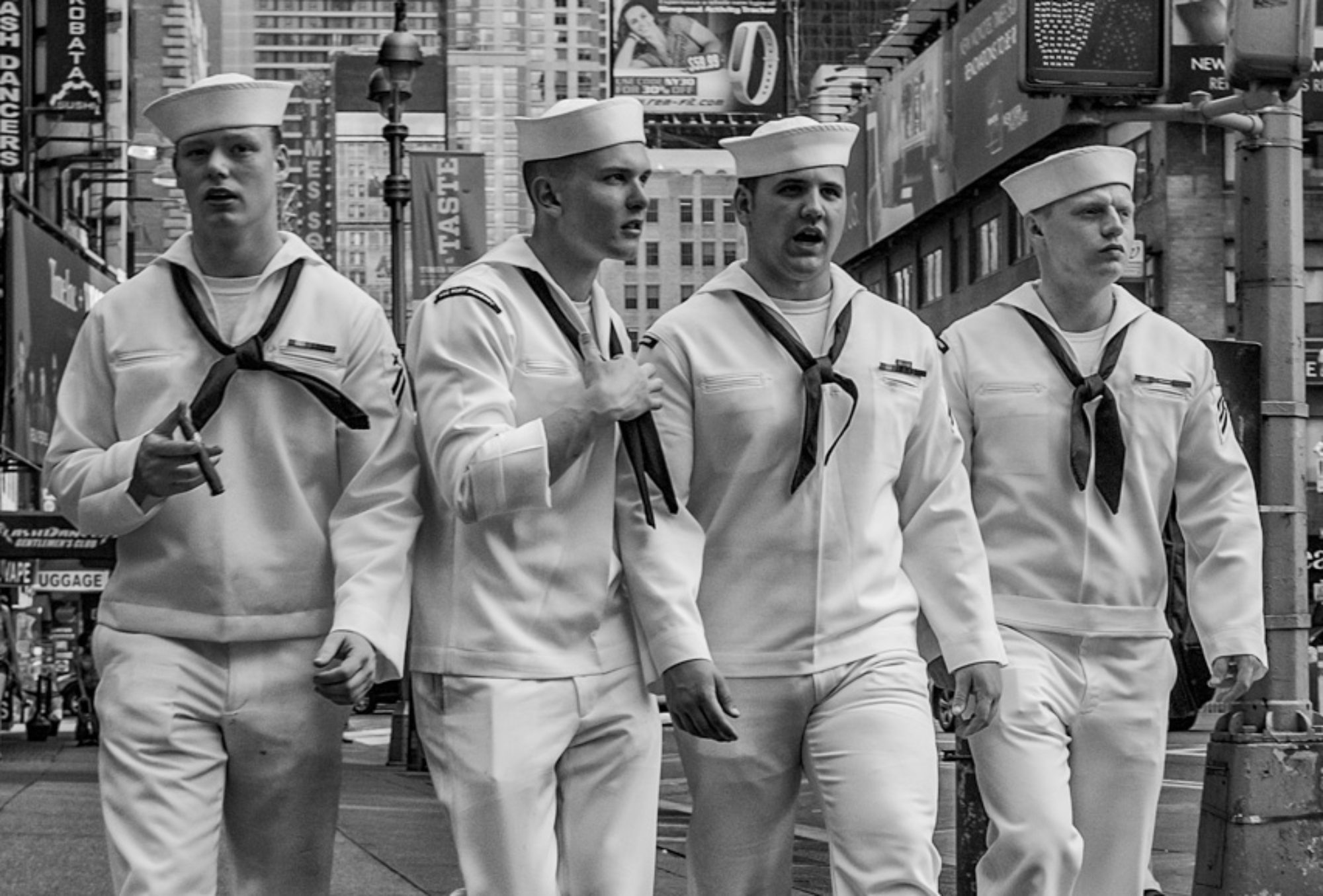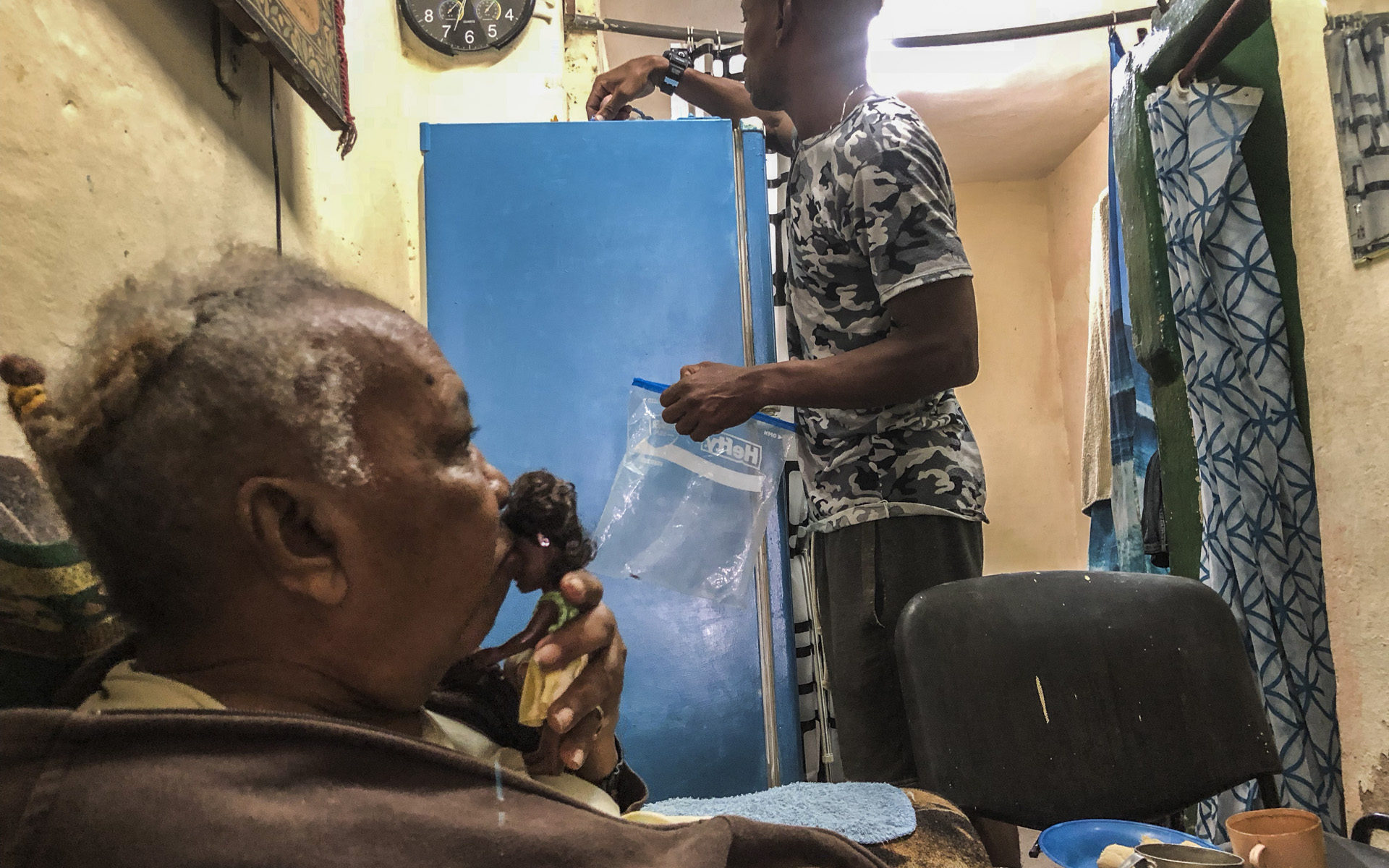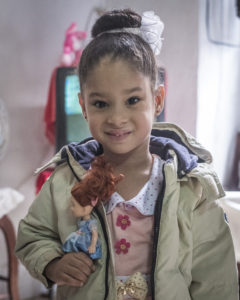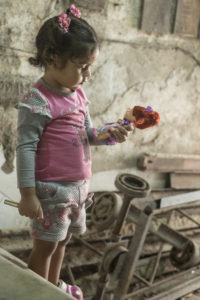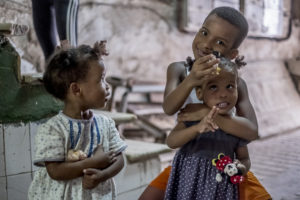Prelude
A photographer friend heard I was heading to Havana and shared info about a man she had met there. She told stories of time with him and how Mohammed and his mother did not have a refrigerator and gave him money to buy one. She later saw him carrying bread and yogurt whereupon he came running to greet her pulled his wallet out to show that he still had her money for the fridge (having not spent it on the food.)
I was heading to Cuba in a few weeks for a street photography workshop with David Hobby (aka “Strobist”) and Joe Newman the trip organizer. Our anticipated schedule had ample time to explore on our own, so when the idea of visiting Mohammed came up, I was amenable to the idea. She sent details on where he lives as well as a letter to print out and take to him.
Central Havana
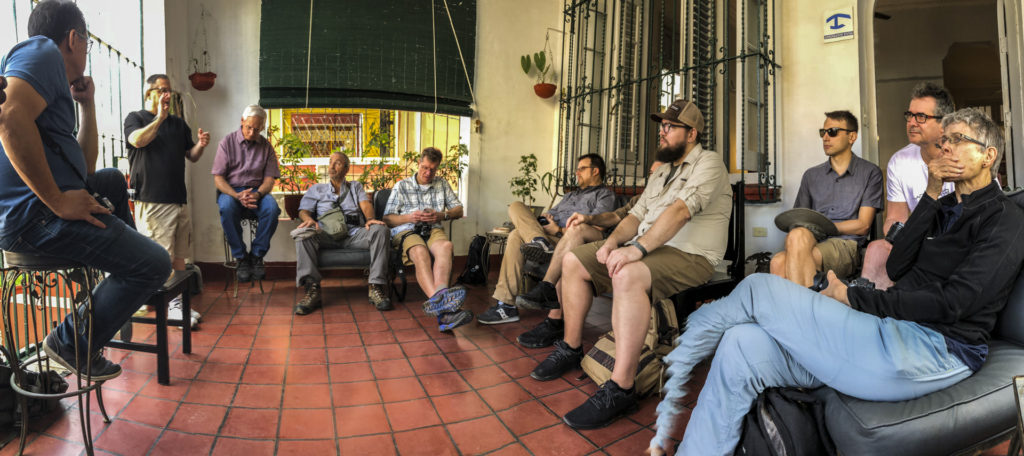
We had free time after our first morning session to explore so I decided to walk to where Mohammed lived in Central Havana (a mile or so from where we were staying). There were few, if any tourists on the streets as I got closer to his address, though it was only a few blocks from much more popular areas. The description I had was his building’s street number and that it was a “ground floor, apartment is straight back, only door at the end of the entry hall. (it’s grim) The front door to the building is often open.”
I found the apartment building and walked in. Sure enough, the building door was open and I walked down the hall to an open apartment door where an elderly woman was sitting and I asked if Mohammed was there. She did not speak (I suspect a stroke, because she never left the chair and later on never did more than make grunting sounds when communicating) – but gestured in a way for me to understand that he was around outside.
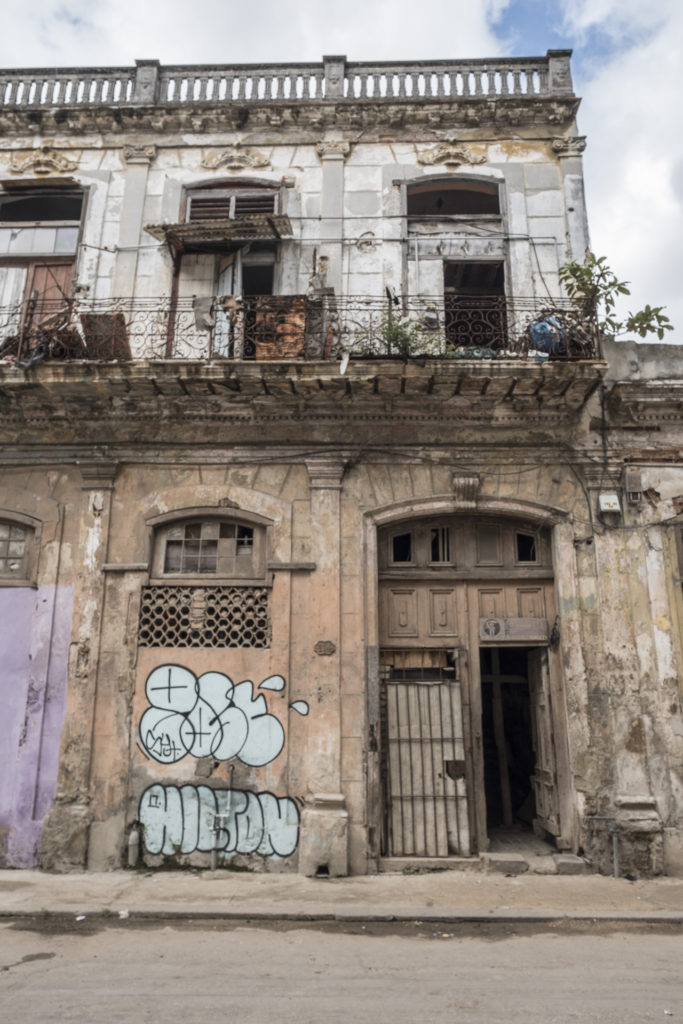
As I walked outside, a young man that was hanging out with a small group of people across the street asked what I was looking for. I explained I was looking for Mohammed and that I was given his name by a friend from my home. He said that Mohammed was nearby and after a few minutes, he spotted Mohammed walking around the corner. I greeted Mohammed outside and then he eagerly invited me into his apartment where he then introduced the woman as his mother.
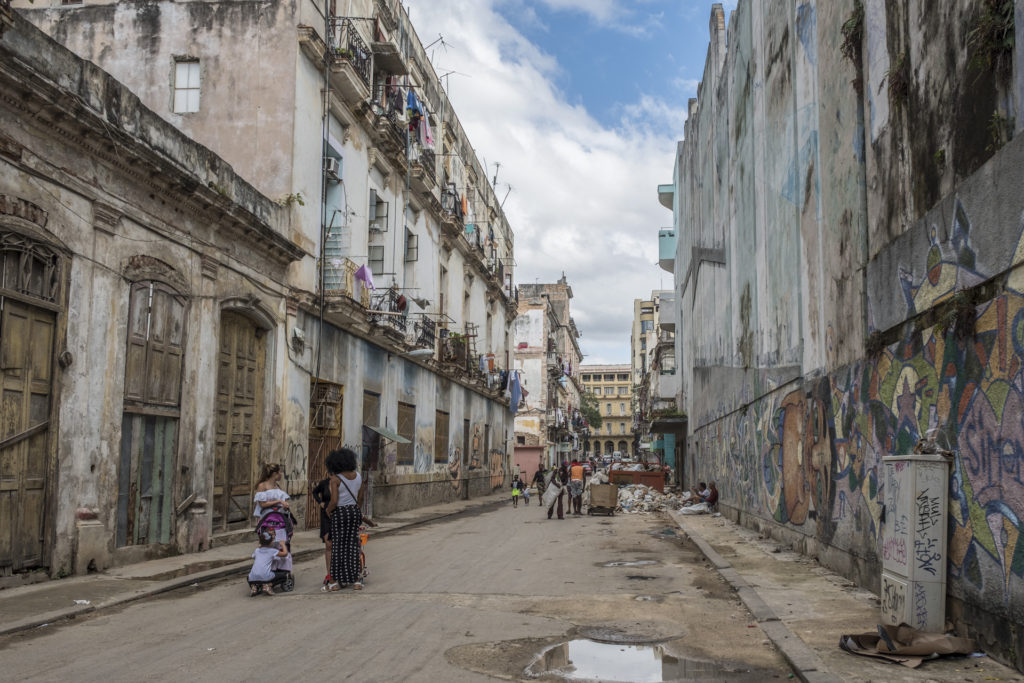
The apartment was a single room with no windows located mostly under the stairs of the building. There was what appeared to be a back area separated by a curtain which was the bedroom area. Farther forward, there was a bathroom with a curtain as a door and the rest in the front area had a blue refrigerator, a comfy chair that his mom was sitting in, an armless side chair next to that and a counter on the other side that served as a kitchen area. There was no sink, no window or any other furniture I could see. The room was so small that the front door was left open to let air and light in from the halls – and so the side chair could fit next to it. A radio was blaring Cuban music from the floor.
As we walked in the apartment, Mohammed was eager to show me the fridge – and made sure that I took a picture of him with it to show that he bought it. I shot a few cell phone shots of the fridge and then he ushered me to sit on the (only) chair to talk. I gave him an old iPhone 4 (my friend said he needed any old phone) He was excited to get it and again, wanted to pose for a shot with that to show.
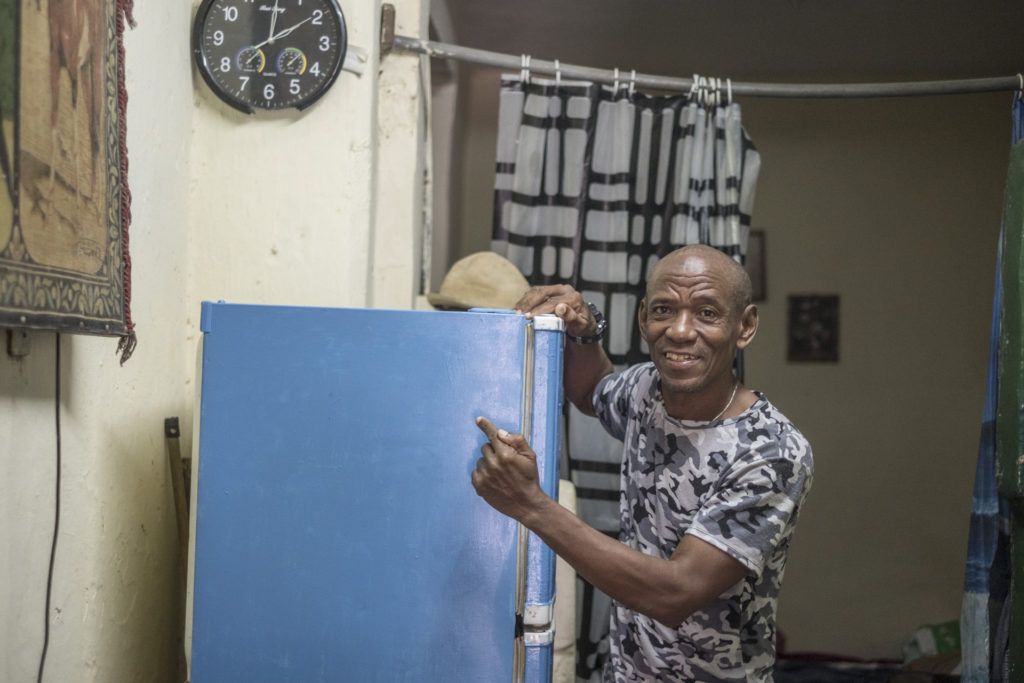
We talked some more as we went out to pick up some drinks (I had a beer – he and his mom colas.) When we got back to the apartment, I gave him several small paper pads and a box of pens. He immediately asked me to follow as we walked throughout the building as he handed out one pen and pad to each apartment.
Everyone receiving these things were more appreciative than I could have imagined. One woman was clutching the pad to her heart and just saying “mucho gracias” over and over. She was the only person I asked to take a portrait of, but she did not want to be seen as she was not properly dressed or made up.
We came back to the apartment, whereupon I asked if I could give some dolls to his friend that my friend had met. He started going through the bag of dolls while sitting on the arm of his mother’s chair. A smile started to grow on her face as she handled them – it was as if she had not handled a doll in her life. She literally was giggling as she clutched one of the dolls.
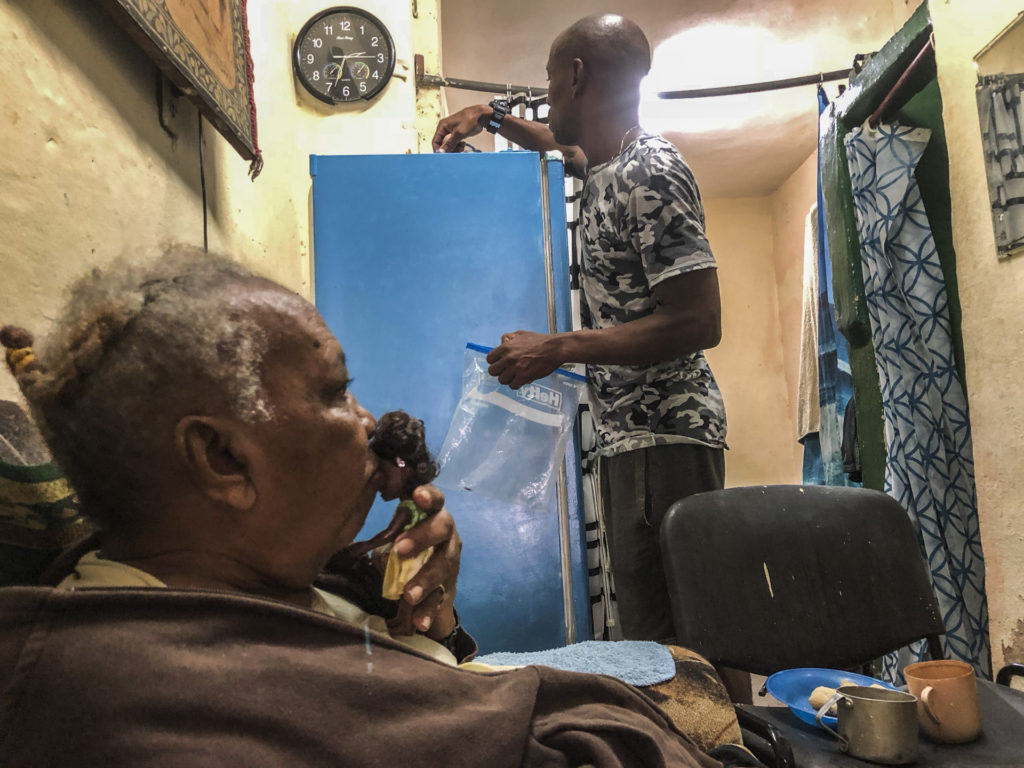
When a mother passed the open door with a young girl, Mohammed lept up to introduce me to them and give her one of the dolls. At this point, I asked if I could take their pictures.
We then went upstairs to another apartment to give a doll to the little girl there. And again, when we got back downstairs, another young mother with three kids walked by and Mohammed gifted them more of the dolls right outside his door.
I was out of gifts at this point and said that I wanted to go out and continue photographing on the streets. I asked if I could hire him as a guide which he was excited to do. As I waited for him to change to go out, his mother was playing with one of the dolls and continued to clutch it to her chest. I was torn between wanting to photograph the scene and just letting her have this moment and not intrude. Mohammed got ready, then pulled some bread and lettuce from the fridge and made a sandwich. (I did not say anything at the time, but had full intentions on taking him for a meal when we were done.)
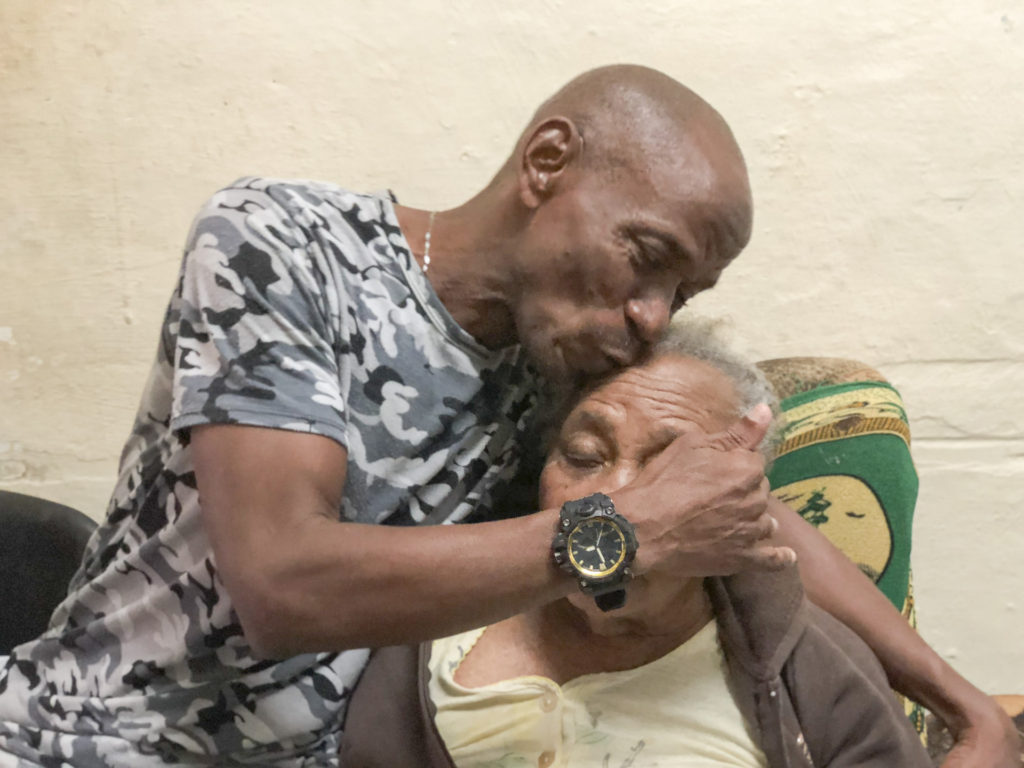
3:00:43
I put my backpack on again, slung my camera over my shoulder – shot a few pics of the two of them and we left the building (time stamp was 3:00:43) When we exited the building, Mohammed ran across the street to hand the sandwich to a woman that was part of the group of people that I had first met looking for him.
Mohammed suggested I shoot some construction going on at the end of the street. Not what I was looking to capture, but snapped a few off as I anticipated we would have plenty of time for us to discuss what I was looking for.
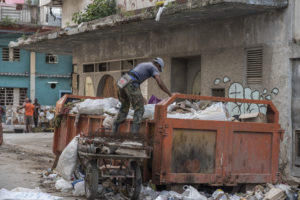
We were walking in the middle of the street for another half a block when a middle aged man in a red tracksuit on a small nondescript and beat-up motorcycle coming toward us stopped to get off and speak to Mohammed.
Something is not right
The man pulled out his wallet and showed some sort of identification to Mohammed and asked him for his ID card. Now, keep in mind that I speak as much Spanish as I do Lithuanian, which is to say none, so I have no idea what is going on. Mohammed pulled out his wallet and handed over what appeared to be a well worn plastic laminated id card which the motorcyle man then proceeded to look at, and then started speaking into a small radio which seemed to have appeared from nowhere.
I am standing a few feet away minding my own business, arms crossed as I survey the situation. There are no alarm bells going off nor have I felt any pangs of concern – though I know I am in a country with very different civil liberties. Their conversation took a break and I leant over to Mohammed to ask what is going on to which he answered that this is a police officer and that citizens are not supposed to be socializing with tourists. My brain is stuttering a little at this comment, as that is kind of what our group has set out to do.
More time goes on and a younger man with stylish mirrored shades in a tight designer v-neck tee shirt with a dangling necklace walks up to us from the other direction. My first instinct was that these people knew each other and were greeting each other on the street. Then he took out his wallet and flashed his PNR identification. I now know that PNR is the Policía Nacional Revolucionaria. The three of them were then chatting, and then the second guy started looking Mohammed’s ID card.
And then, the second man asked to see my identification. I pull out my passport, which has my visa in it along with my boarding papers which I was told to carry with me. He asked me if I knew Mohammed and I explained that I just met him to give him a letter from a friend and that I was here with a group to do photography. The two men spoke more to each other, and into the now ever more present radio, and then announced we should follow them.
Local Precinct
If you are wondering why there are no photos in this section of the story, it is because we were clearly instructed to never photograph the police or military. I figured that at some point, I might be asked to show photos on my camera or phone, so did not want some sneaked shot of any of this to come up and cause a real problem as I was pretty confident that I had done nothing wrong otherwise.
We walk a few blocks with Mr. Motorcycle pushing his bike by his side and end up at a storefront sized PNR “precinct” station. This is on a busier street with a lot of people walking around, several bicycle taxis and the occasional car. Aside from a few uniformed police nearby, it is fairly nondescript.
I had been waiting around 20 minutes and now start to get frustrated that this is taking so long. After all, I am in Cuba to do photography and it is a getting closer to “blue hour” and the group has plans to meet nearby at 6:00.
What would I need a car for?
They still have my passport, and while I am standing casually in the street, I am keeping my eye on who is holding it. It is very clear to me that the PNR guys do not want to speak with me unless they are specifically asking me for information, so I casually ask Mohammed what is taking so much time.
“We are waiting for a car.” he answered. In my head, I was like, “OK”. Then I was thinking “what would we need a car for!?”.
I am still not really phased by what is going on and frankly more upset about losing valuable time shooting. It is getting close to 4 now, so I am figuring that at least this can’t go on too much longer and I can catch up with the group for our sunset shooting.
“Come this way.” motorcycle man says again. Mohammed and I are now causally walking up the street and around the corner with the two original PNR guys nearby and now one uniformed officer. To any casual observer, you would barely think that I was with Mohammed and would have no idea that we were being “escorted” by the police – we were all spread out by twenty to thirty feet.
Given my aforementioned lack of language skills, the only indication I have of what is going on is that Mohammed has told me that he should not be with a tourist and that we are waiting for a car. While not the most well traveled person, I have spent a lot of time in many countries all over the world and feel reasonably comfortable that whatever is going on is some sort of either misunderstanding or some local matter that I will soon be excused from.
The Paddy Wagon
So we walk up to a 30-foot or so long bright white truck that turns out to be a paddy wagon. It looked like a delivery truck, though ironically, was way to clean and in good repair to be owned by any company there. Motorcycle man points for me to get in as he still clutches my passport. You know when someone asks you something seemingly odd, and in the back of your head you say to yourself in that super slow way “O. K.” Well, try it a little slower and that is how it sounded in my head.
The truck bed is much higher than you would think. There are two metal rungs to step-up with, though the lowest one is at least three feet off the ground. I grab a hand bar and hoist myself up top get in and notice that there is already a man sitting on one of the four benches there with his hands cuffed behind his back. Mohammed joins me and we sit on one of the benches along the side facing the back-to-back center benches with the other guy.
The truck is surprisingly clean inside with well varnished wooden benches. Aside from the guy who had a paddy wagon reservation before us and the one uniformed officer sitting near the open back, the only other things in the back are several police billy clubs that are hanging between the two center benches. It still seems odd that you would have billy clubs within an arms reach of guests in such as truck.
At this point, I am actually having fun. While I am sure that my fellow group members will be capturing some great shots and meeting people, I am almost certain none will have had a ride in the back of a paddy wagon. The ride was relatively short – and aside from sliding forward and back on the benches every time the drive changes gears or stops, it was event-less.
Now, keep in mind that the only view I have is out the back of the truck, so I have no idea where we are. Mohammed and I are free to talk and he is expressing extreme apologies for what is going on and has already said how embarrassed he is for this to happen. I assure him that I am not upset with him and am (still) just figuring that the police are doing whatever that they need to do.
Central Station
When the truck stopped, the two original PNR offices appeared at the back of the truck along with a few uniformed police. The handcuffed guy walked over to exit, but from what I could understand, was saying that it was too high for him to get out with his hands behind his back. After a brief discussion, they removed his cuffs so he could climb down.
I went next – and after hopping off the bottom rung, i could see we were at what appeared to be a large police station. (I want to emphasize that every interaction from the start with the officers was polite and respectful. The only time I was physically touched, was when I was exiting the paddy wagon and they wanted to make sure I did not fall from the last step.)
The original undercover guys and some uniformed officers look at Mohammed and me and have a quick discussion – then motorcycle man, with my passport in hand asks for me to follow him. Simultaneously, Mohammed and the other fellow are escorted in the opposite direction. It becomes instantly clear that I am being brought to the front of the station while the others are heading to a back door.
The Wait Continues
We walk into what is now very obviously a police station. The waiting room had to be 50 feet wide and 20 feet tall with a wide desk in the center of the back wall with room for three officers and one computer off to the side. We approached the man who was clearly in charge – I will call him the desk sergeant or “DR”. Motorcycle man handed him my passport and had a brief conversation. It is becoming clear that whatever is going on was communicated by ratio beforehand. DR points to one of the many empty seats along the outside and gestures to sit.
It has been close to 90 minutes since this whole thing has started, and this is the first time I have a moment to reflect on what is going on. I run through a mental list of what has transpired and basically come up blank. While I still have no idea why I am being detained, I am reasonably confident that the resolution will just be a matter of time.
I had bought drinks for Mohammed and his mom earlier on. That was now more than two hours ago, so I was starting to need to use the rest room, I mean bano. (I don’t speak Spanish, but for some reason I can say cerveza and bano easily enough.)
I still have not moved and figure the best plan is to just sit. I have time to look around. There are doors leading to what I assume are locker rooms, offices and the rest of the facility at the back near the sides and I note a continuous stream of young cadets in dark green police uniforms flowing between the main open front door and one of the back doors. Their uniforms contrast with the more stylish blue uniforms that the regular officers are wearing. I notice that while there seem to be more blue uniformed men than women, there seem to be equal numbers of young women and men in cadet dress. The cadets and officers tended to socialize within their own ranks, but there was a lot of chats, greetings and general positive energy between all the officers and cadets.
There were maybe four or five other people sitting in this waiting room at any time – though this small cast changed over the time I was there. A TV high on one wall had a baseball game on. Most everyone had an eye on the game, and whenever people walked through the station, they would check out the score. I even noticed that people would walk in from the outside or pop in from a back office to check out the score.
It is now about 45 minutes since I entered the station and having witnessed how relatively calm the situation was, I decided I needed to address this situation head on. So, get up, walk straight up to the desk sergeant and ask where the bano is. He points at the hallway on the opposite side of the waiting room that I had assumed was an office. There I found two small bathrooms – in the men’s room there was no light, a barely functioning door and a doorless toilet stall with a seatless toilet in a dilapidated corner near a grungy open screened window that let out less odor than the light it let in.
Back at my seat, I was really now getting frustrated with the delay. I was still hopeful to meet up for shooting with the group, so wanted to see how I could push things forward. Nobody blinked an eye when I went to the bathroom. No one cared when I had also wandered around on the way back looking at the several glass enclosed display cases with various historical objects. (It probably did not help at this point looking at the case with the whips and bludgeons clearly marked as “objects of torture”.)
When the DR was not busy, I walked up to ask as best as I could what was taking so much time. He responded by touching his uniform epaulettes and said what I understood to be that he was waiting for a superior officer. I was actually relieved by this as I figured that they would send someone over who I would be better able to speak to so I could get out of there. He gestures for me to sit again, so back to my seat I go.
I am noticing that other people are using their cell phones in the waiting room. Up to this point, I have had my camera in by backpack and not dared take my phone out. I casually take it out and decide that despite the cost for making a call, now would be a justifiable time to use it.
Now, before we left, David and Joe (the trip organizers) had sent us local cell phone numbers for emergency use. I figured that as it was closing in on six o’clock, I should at least let them know where I am. Optimistically, the station was within a few blocks of where we were supposed to meet – so I was thinking I could meet up even if a little after we had planned.
I selected Joe’s number from my contact list, having diligently stored it before I left the states. As I put the phone up to my ear, the desk sergeant snapped to get my attention and gestured “NO PHONES HERE” where needless to say, I quickly cancelled the call. I sat for a while longer and having taken a few strolls around already, asked the uniformed guard stationed just outside of the always open front door if I could call outside. He gestured yes and I stepped outside to use my phone.
I dialed Joe’s number and listened as the phone rang and rang. No worries, I have David’s number – hate to bother him, but I figured that after 3 hours of waiting, this might not be an unreasonable intrusion. I selected David’s “Cuba” cell phone number in contacts and dialed. After a few rings the line picked up – however, the connection was very weak and the person on the other side was clearly not David. I figured I misdialed, so checked the number and called again. Same result. (Without getting into details, there were easily explainable reasons that both their phones were not working at this time.)
I was now pacing more regularly and again asked the DR what was going on. And he again indicated he was waiting for someone. I tried using Google translate to tell him that I needed to meetup with my group, but he either did not, or chose to pretend to not understand or just possibly did not care. Throughout the entire time a the station, I have noted that he would take out a large paper record and carefully make notes on various pages. Others took turns at the various three main seats, and only once or twice did anyone sit at the computer. I did see that the Ethernet cable was plugged in and there was network traffic. I have also kept an eye on my passport which he has had out on occasion but has stowed in a desk drawer.
It is now around six oclock and I have resigned myself to the fact that I will be missing my blue hour shoot. I am still concerned that nobody knows where I am, so I go outside to try to call David and Joe again with the exact same results. I consider calling my wife, but decide that there is not much that will do beside create either intense amusement or concern on her side, but nothing to help resolve the situation.
Over the last few hours, the DR had called me over a few times, the first time to see my camera. I pulled it out and explained again that I was there for photography. He called me over again – this time to update the record book he has been writing in all day. There was a 4 or so inch section the middle of one of the ledger pages with two small blanks in the writing. He was asking the dates of my arrival and departure from Cuba. I answered and also showed the dates on my phone to be clear. He slowly and methodically wrote the dates in the ledger., Then, it was back to my seat.
I think I tried my phone again, and when I was coming back in, the desk sergeant came over to me and started to talk in a friendly way. A young cadet who spoke English very well happened to be standing nearby and told me that the DR asked if I was an engineer. ( I assume he looked though my passport which lists my occupation as engineer. ) I said yes, but was here taking photos as I know that I can’t be working there and certainly not a tourist. He explained that the DR was also an engineer – and a building technician. The DR seemed to take great joy in this little conversation as he was obviously proud about what I assume was his other profession.
Jaw Drop
The cadet then spoke briefly with the DR, clearly about me. He turned to me and asked how I knew Mohammed. I explained again about getting his info from my friend and bringing the letter to him. He pressed me if I had any other knowledge of him to which I was clear that I did not.
He then goes on to explain that Mohammed is an “unsavory character”. As my eyebrows raise, he continues to say that Mohammed has had a history with the police – that he was arrested for some sort of drug trafficking offence and that “these are very serious crimes in our country.” Without hesitation and with absolute frankness I responded that this was “a serious offence” in my country too!
For the first time, my worry meter has moved off of zero. After a brief moment thinking of Midnight Express and how Billy Hayes personally described his ordeal compared to the movie , I was pretty sure that neither version was one I would like to experience.
I sat for down for a moment and then recalled that when we arrived, Joe had introduced us all to his local fixer Sergio. I had sat with Sergio crammed into the front of our van from the airport when I arrived and he had also joined us for our initial meal where he had given me his last business card “just in case I needed to reach him.” This seemed like a good time to pull out that card. Up to this point, I really was not worried and figured I was just dealing with a slow bureaucracy.
The Fixer
It is now after 6:00pm and I step outside and call his number. A ring or two and I am talking with Sergio. I quickly explain the situation and after figuring out which station I am at, he says he will be there as soon as he can.
I am now walking around and waiting by the front door, or sitting and waiting. The cast of cadets has rotated through several groupings, and despite the friendly treatment I have received up to this point, there was one cadet who was giving me quite the stare. Standing in the middle of the room and just glaring at me. This was not a gaze, this was a “lets spend some time in the back room with nobody around stare.” If you recall, there is literally a display case nearby with brass knuckles, bludgeons, whips and photos of tortured revolutionaries – this was not lost on me. Thankfully, he left with a group of cadets after not too long.
After a very long 40 minutes, Sergio walks up the front steps. I quickly brief him on the situation and we walk to the front desk. Sergio re-explains the whole story directly to the DR – they have an animated discussion for a few minutes, then again and without surprise, he asks us to take a seat.
Now, around 7:00pm, Sergio explains that they are waiting for an immigration officer to come. DR said he is from a main office and is on his way. I have no reason why an immigration officer would want to talk to me, and Sergio and I decide that they are just trying to give me a hard time. While I am still not freaking out or particularly nervous, I confided that at this point I had every expectation that they had intended to keep me waiting as long as they could and would not have been surprised to spend the night there.
Sergio checks again about progress to which we get the same response. Then about 7:30pm, the desk sergeant makes a call – then with no fanfare tells Sergio I am free to go. I approached the desk – and he handed back my passport. I thanked him and actually shook his hand to day goodbye.
We walked out – and I would say briskly. I did stop and turn to grab one cell phone shot before we grabbed a cab to head back to my room.
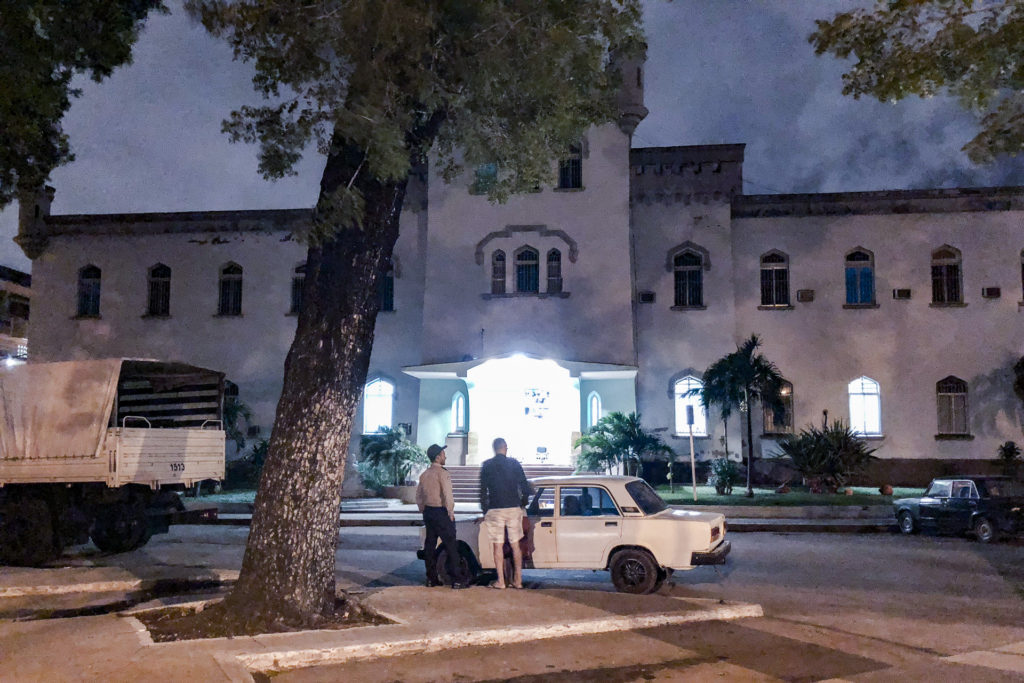
Epilogue
When I returned to our apartments, I learned that Sergio had tried to contact Joe. The lack of details about my situation was magnified as the story was passed among the group to where the common thought was that I was arrested and in jail.
I got back to the villa’s front porch where David was sitting with a few of the folks looking over their evening’s photos. Despite David’s odds for the reasons he thought I was detained, we had a good laugh as I recounted the days events. When I commented that I was upset that I missed my blue hour shot, he assured me that this story was far better than any shot I would have gotten.
The only thing better than David’s knowledge and approach to teaching lighting and photography might be his choice of, and timing to introduce me to my first Havana Club 7.
